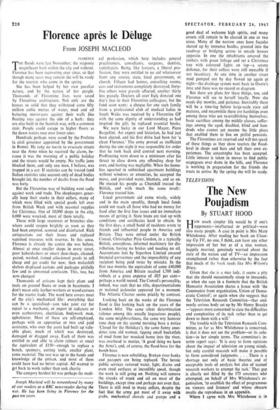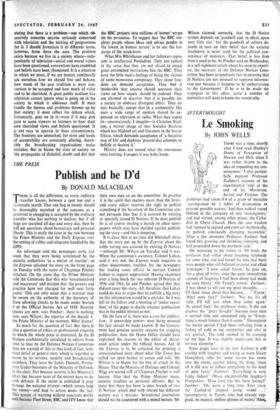The New Poujadism
'TELEVISION
By STUART HOOD
How much simpler life would be if one's opponents—intellectual or political—were also nasty people. A case in point is Mrs Mary Whitehouse. After reading her book on Clean- ing Up TV, no one, I think, can have any other impression of her but as of a nice woman, happily married, genuinely worried about the state of the nation and of TV—an impression strengthened rather than otherwise by the fact that much of the hook reads like Mrs Wilson's Diary.
Given that she is a nice lady, it seems a pity that she should occasionally stoop to innuendo, as when she says in a footnote that the British Humanist Association shares a house with 'the Communist front organisation, Union of Demo: cratic Control'; or again when she suggests that the Television Research Committee—that emi- nently serious body set up by Mr Henry Brooke =appears more concerned to state the difficulties and complexities of its task rather than to get down to them with a will.'
The trouble with the Television Research Com- mittee, as far as Mrs Whitehouse is concerned, is that it does not see the problem—or its solu- tion—in her simple terms. The committee's in- terim report says: 'It is easy to form opinions about the impact of television on young minds, but only careful research will make it possible to form considered judgments. . . . There is a shortage not only of basic theories and of acceptable tools of analysis but also of trained research workers to attempt the task.' That gap is clearly not filled by the 175 amateurs who attempted, on behalf of Mrs Whitehouse's or- ganisation, `to establish the effect of programmes on viewers and listeners' and whose obscure results she reproduces in an appendix.
Where I agree with Mrs Whitehouse is in stating that there is a problem—one which obi- sessively concerns anyone seriously concerned with television and the making of programmes for it. I should formulate it in different terms, however, from those she uses. The problem exists because we live in a society where—inde- pendently of television—social and moral values have been questioned, conventions have crumbled and beliefs have been abandoned. It is a situation in which we must, if we are honest, continualfy ask ourselves how we should live and behave, how much of the past tradition is mere con- vention to be scrapped and how much of value and to be cherished. A great public medium like television cannot ignore what is going on in the society to which it addresses itself. It must handle the themes and problems thrown up by that society; it must reflect the debate which, fortunately, goes on in it—even if it may give pain to some viewers or listeners to hear their own cherished views and beliefs questioned. It is not easy to operate in these circumstances. The frontiers are unmarked, for 'taste and levels of acceptability are constantly altering. Inevit- ably the broadcasting organisations make mistakes. But to blame the state of society on 'the propaganda of disbelief, doubt and dirt that
the BBC projects into millions of homes' verges on the paranoiac. To suggest that 'the BBC em- ploys people whose ideas and advice pander to the lowest in human nature' is to use the lan- guage of the witch-hunt.
What Mrs Whitehouse and her followers repre- sent is intellectual Poujadism. They are radical in the sense that they are not afraid to attack great entrenched institutions like the BBC. They have the little man's feelings of being the victims of some monstrous conspiracy. They shout free- dom yet demand acceptance. They find it intolerable that anyone should question their views on how society should be ordered. They are alarmed to discover that it is possible for a society to embrace divergent ethics. They do not, basically, accept that in a community like ours a wide range of opinion should be ex- pressed on television or radio. What they aspire to—unconsciously, I imagine—is Christian Real- ism, a mirror image of that Socialist Realism which has blighted art and literature in the Soviet Union, which demands acceptance of 'a Socialist way of life' and deplores 'present-day attempts to belittle or destroy it.'
History does not record what the fricoteuses were knitting. I suspect it was baby boots.































 Previous page
Previous page